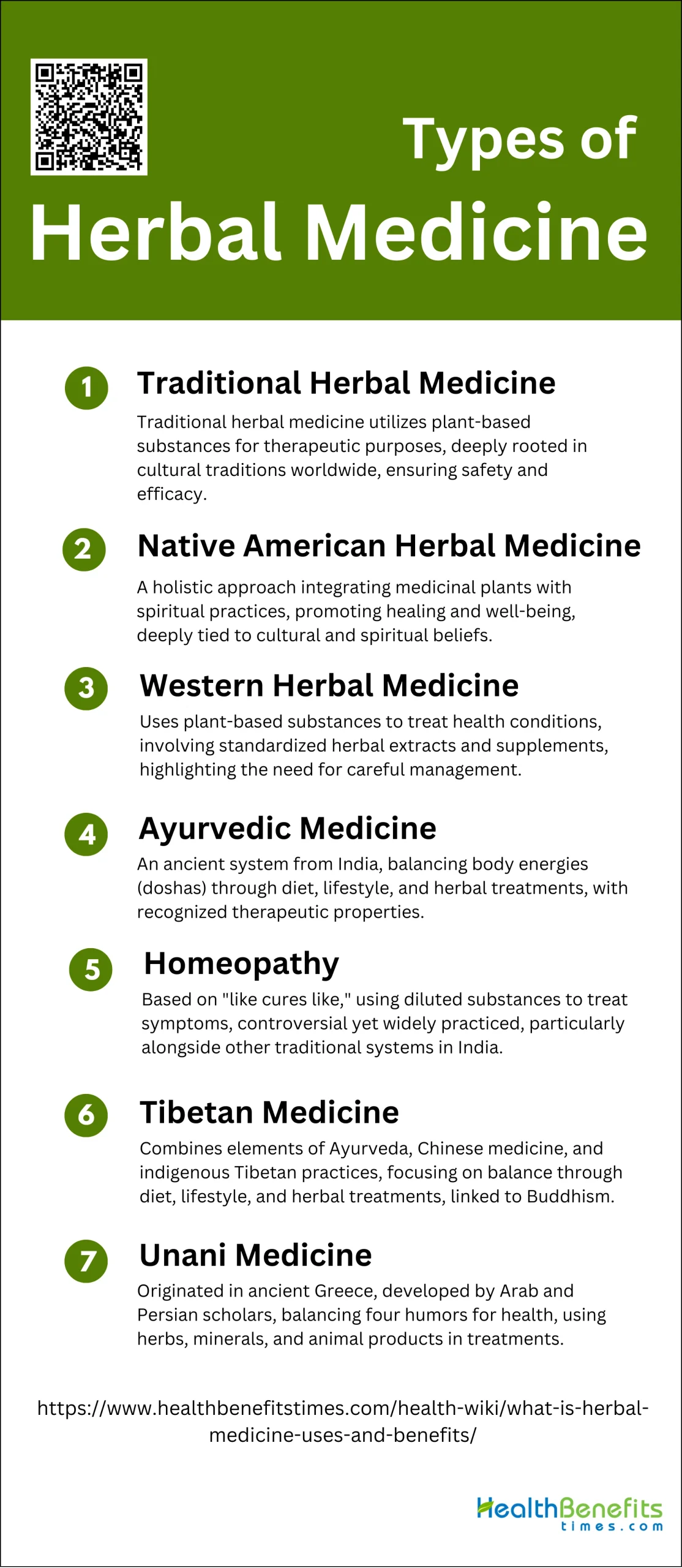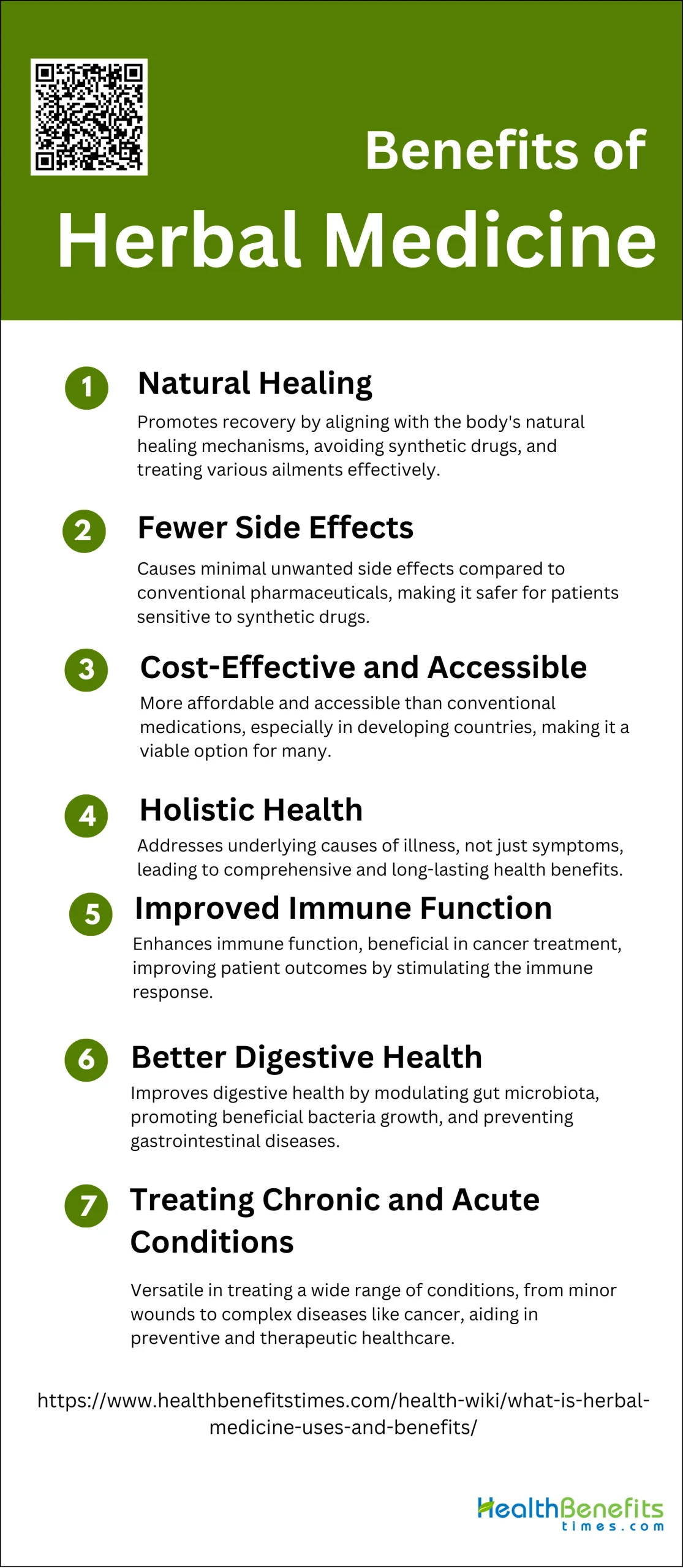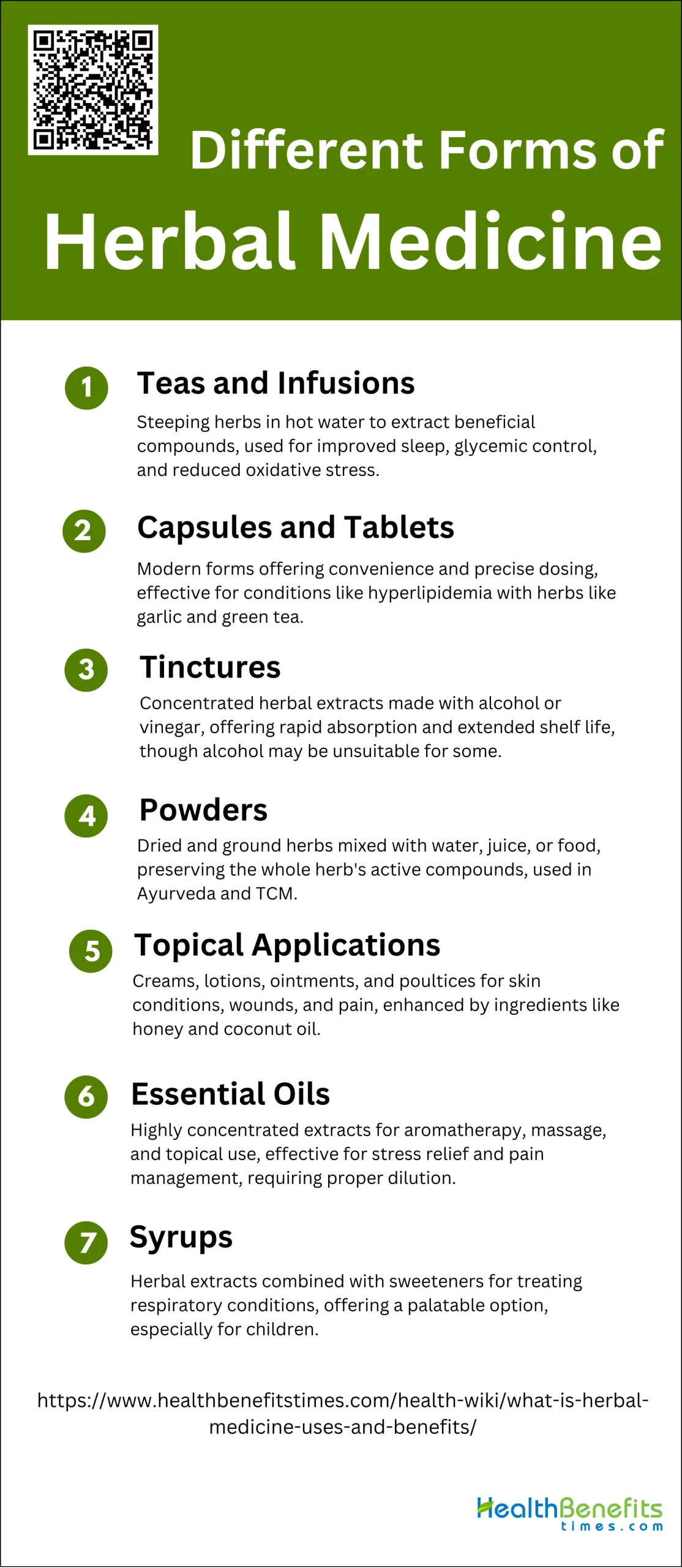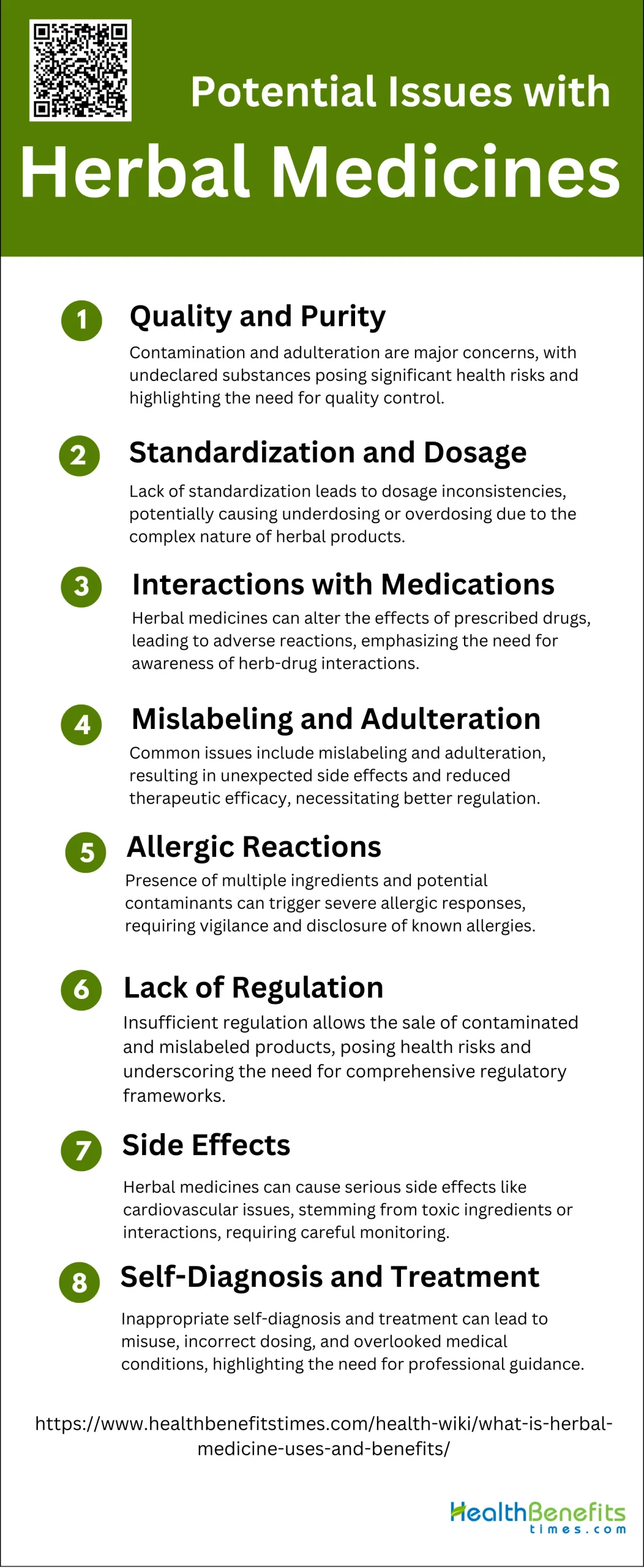 Herbal medicine, also known as botanical medicine or phytomedicine, involves the use of plants or plant extracts to treat various health conditions and promote overall well-being. This practice has been integral to traditional medical systems such as Traditional Chinese Medicine (TCM) and Korean herbal medicine for thousands of years. Herbal medicines can include a wide range of plant parts, such as leaves, roots, flowers, and seeds, and are often used in complex formulations to leverage the synergistic effects of multiple bioactive components. Despite their long history and widespread use, the regulation and classification of herbal medicines vary significantly across different countries, with some nations requiring rigorous evidence of efficacy and safety, while others may classify them as dietary supplements with less stringent oversight.
Herbal medicine, also known as botanical medicine or phytomedicine, involves the use of plants or plant extracts to treat various health conditions and promote overall well-being. This practice has been integral to traditional medical systems such as Traditional Chinese Medicine (TCM) and Korean herbal medicine for thousands of years. Herbal medicines can include a wide range of plant parts, such as leaves, roots, flowers, and seeds, and are often used in complex formulations to leverage the synergistic effects of multiple bioactive components. Despite their long history and widespread use, the regulation and classification of herbal medicines vary significantly across different countries, with some nations requiring rigorous evidence of efficacy and safety, while others may classify them as dietary supplements with less stringent oversight.
History of Herbal Medicine
Herbal medicine, also known as herbalism, has a rich and extensive history that dates back to ancient times. Archaeological evidence suggests that the use of medicinal plants began during the Paleolithic age, approximately 60,000 years ago, with written records of herbal remedies appearing over 5,000 years ago in Sumerian texts. The tradition of documenting botanical and medicinal knowledge continued through the centuries, with significant contributions from various cultures. For instance, European herbals from the 16th and 17th centuries provided detailed descriptions and illustrations of plants used for treating various ailments, including rheumatic disorders. These herbals were not only a source of medical knowledge but also a reflection of the cultural and scientific advancements of their time. The practice of herbal medicine has evolved, with many traditional remedies being validated by modern pharmacological studies, leading to the development of important therapeutic agents such as aspirin and taxol. Despite the advent of modern medicine, herbal medicine remains an integral part of healthcare systems worldwide, continuing to offer valuable insights and treatments derived from nature.
Types of Herbal Medicine
Herbal medicine encompasses a variety of practices and traditions that utilize plant-based materials for medicinal purposes. Here are some common types of herbal medicine:
1. Traditional Herbal Medicine
Traditional herbal medicine encompasses a wide range of practices that utilize plant-based substances for therapeutic purposes. These practices are deeply rooted in cultural traditions and have been used for centuries to treat various ailments. For instance, traditional Chinese medicine, Ayurvedic medicine from the Indian subcontinent, and Aboriginal medicine in Australia all incorporate herbal ingredients. These systems often include not just plant-based substances but also minerals and animal products. Despite the widespread use of traditional herbal medicine, there are ongoing challenges in ensuring the safety and efficacy of these treatments, necessitating improved pharmacovigilance practices.
2. Native American Herbal Medicine
Native American herbal medicine is a holistic approach that integrates the use of medicinal plants with spiritual practices. This system of medicine has been passed down through generations and is deeply intertwined with the cultural and spiritual beliefs of Native American tribes. The use of herbs such as echinacea, sage, and sweetgrass is common, and these plants are often used in rituals and ceremonies to promote healing and well-being. The knowledge of these medicinal plants is typically shared orally and is considered a sacred tradition that contributes to the overall health of the community.
3. Western Herbal Medicine
Western herbal medicine, also known as phytotherapy, is a practice that uses plant-based substances to treat various health conditions. This form of medicine has its roots in ancient Greek and Roman traditions and has evolved over the centuries. In modern times, Western herbal medicine often involves the use of standardized herbal extracts and supplements, which are regulated to ensure quality and safety. The popularity of herbal supplements in Western countries is significant, with substantial out-of-pocket expenditures on these products. However, the concurrent use of herbal and conventional medicines can lead to drug interactions, highlighting the need for careful management and monitoring.
4. Ayurvedic Medicine
Ayurvedic medicine, originating from the Indian subcontinent, is one of the oldest systems of medicine in the world. It emphasizes a holistic approach to health, focusing on balancing the body’s energies (doshas) through diet, lifestyle, and herbal treatments. Ayurveda uses a wide range of herbs, such as turmeric, ashwagandha, and neem, which are believed to have various therapeutic properties. Modern research has acknowledged the effectiveness of Ayurvedic treatments, and efforts are being made to integrate these practices into mainstream healthcare to provide quality healthcare to all.
5. Homeopathy
Homeopathy is a system of alternative medicine based on the principle of “like cures like,” where substances that cause symptoms in a healthy person are used in diluted forms to treat similar symptoms in a sick person. Homeopathic remedies are prepared through a process of serial dilution and succussion (vigorous shaking). Despite its widespread use, homeopathy remains controversial, with debates over its scientific validity and efficacy. In India, homeopathy is practiced alongside other traditional systems like Ayurveda and Unani, and it is considered a part of the non-allopathic medical systems.
6. Tibetan Medicine
Tibetan medicine, also known as Sowa-Rigpa, is a traditional system of medicine that combines elements of Ayurveda, Chinese medicine, and indigenous Tibetan practices. It focuses on maintaining balance within the body through diet, lifestyle, and herbal treatments. Tibetan medicine uses a variety of herbs, minerals, and animal products to create complex formulations aimed at treating various ailments. The practice is deeply connected to Tibetan Buddhism and emphasizes the importance of spiritual well-being in achieving physical health.
7. Unani Medicine
Unani medicine, also known as Greco-Arabic medicine, is a traditional system of medicine that originated in ancient Greece and was later developed by Arab and Persian scholars. It is based on the principles of balancing the four humors (blood, phlegm, yellow bile, and black bile) to maintain health. Unani medicine uses a variety of herbs, minerals, and animal products in its treatments. In India, Unani medicine is practiced alongside other traditional systems like Ayurveda and Siddha, and it is recognized for its holistic approach to health and disease management.
Benefits of Herbal Medicine
Herbal medicine, which utilizes plant-based materials for therapeutic purposes, offers a range of benefits. Here are some of the key benefits of herbal medicine:
1. Natural Healing
Herbal medicine has been integral to traditional healing practices for thousands of years, leveraging the natural properties of plants to treat various ailments. The use of herbs in wound healing, for instance, involves disinfection, debridement, and creating an environment conducive to natural healing processes. This natural approach is often preferred because it aligns with the body’s own healing mechanisms, promoting recovery without the need for synthetic drugs.
2. Fewer Side Effects
One of the primary reasons for the enduring popularity of herbal medicines is the perception that they cause minimal unwanted side effects compared to conventional pharmaceuticals. For example, Chinese herbal medicines are often used in conjunction with chemotherapy to reduce the side effects and complications associated with cancer treatments. This makes herbal medicine a safer alternative for many patients, particularly those who are sensitive to the side effects of synthetic drugs.
3. Cost-Effective and Accessible
Herbal medicines are often more affordable and accessible than conventional medications, especially in developing countries where up to 80% of the population relies on them for healthcare. The use of natural medications for managing oral health conditions, for instance, is a logical alternative to pharmaceutical methods due to their availability and low cost. This cost-effectiveness makes herbal medicine a viable option for a broader segment of the population.
4. Holistic Health
Herbal medicine often takes a holistic approach to health, addressing not just the symptoms but the underlying causes of illness. This is evident in the use of herbal treatments for gastrointestinal and liver diseases, where herbs like ginger and liquorice are used to treat conditions such as nausea, vomiting, and peptic ulceration. This holistic approach can lead to more comprehensive and long-lasting health benefits.
5. Improved Immune Function
Herbal medicines have been shown to enhance immune function, which is particularly beneficial in the context of cancer treatment. For instance, certain Chinese herbal medicines can stimulate the immune response in the tumor microenvironment, thereby exerting antitumor effects. This immune-boosting property makes herbal medicine a valuable adjunct to conventional cancer therapies, helping to improve patient outcomes.
6. Better Digestive Health
Herbal medicines have significant prebiotic potential, which can improve digestive health by modulating the gut microbiota. Studies have shown that herbs like Glycyrrhiza glabra and triphala can alter the growth and abundance of beneficial bacterial species in the gut, promoting better colonic epithelium function and reducing inflammation. This makes herbal medicine an effective option for managing digestive health and preventing gastrointestinal diseases.
7. Treating Chronic and Acute Conditions
Herbal medicines are used to treat a wide range of chronic and acute conditions, from minor wounds to complex diseases like cancer. For example, herbal treatments are commonly used in wound management to aid the natural healing process, and in cancer treatment to enhance the efficacy of chemotherapy and reduce its side effects. This versatility makes herbal medicine a valuable tool in both preventive and therapeutic healthcare.
Common Herbs Used in Herbal Medicine
Common herbs have been utilized in herbal medicine for centuries due to their diverse health-promoting properties. Research has highlighted the potential of various herbs in reducing the risk of chronic diseases such as cardiovascular diseases (CVDs) and cancer. For instance, herbs from the Allium, Labiatae, Umbelliferae, and Zingiberaceae families, as well as flaxseed, licorice root, and green tea, contain active phytochemicals like flavonoids, terpenoids, and polyphenolics, which exhibit antioxidant, antiplatelet, and antitumor activities. These compounds can protect LDL cholesterol from oxidation, inhibit enzymes like cyclooxygenase and lipoxygenase, and suppress cholesterol synthesis and tumor growth. Additionally, herbs such as Ginseng, Ginkgo biloba, Ganoderma lucidum, and Gynostemma pentaphyllum have shown therapeutic potential in managing CVDs by interfering with risk factors like hypertension and dyslipidemia. Furthermore, herbs are also employed in treating psychiatric disorders such as anxiety, depression, and insomnia, with mechanisms involving the modulation of neuronal communication and the hypothalamic-pituitary-adrenal axis. Despite their widespread use and therapeutic promise, the safety and potential adverse effects of herbal preparations warrant careful consideration and further research.
Herbal Supplements: Benefits and Side Effects
| Herbal Supplement | Benefits | Side effects |
| St. John’s Wort | Alleviates mild depression | Photosensitivity, interactions with medications |
| Echinacea | Boosts immunity | Nausea, dizziness |
| Ginseng | Increases energy | Headache, Sleep Issues |
| Ginkgo Biloba | Enhance Cognitive fuction | Bleeding risk, gastrointestinal discomfort |
| Turmeric | Anti-inflammatory | Stomach upset, may interact with blood thinners |
| Garlic | Cardiovascular Health | Bad breath, body odor, gastrointestinal upset |
| Milk Thistle | Liver Health | Laxative effects, allergic reactions |
| Valerian Root | Promotes Sleep | Drowsiness, headaches |
| Saw Palmetto | Supports prostate health | Stomach discomfort, headache |
| Ginger | Nausea relief | Heartburn, stomach upset |
| Ephedra | Weight loss, increased energy | Hypertension, insomnia, arrhythmia, nervousness, tremor |
| Kava | Relieve anxiety | Oral and lingual dyskinesia, torticollis, oculogyric crisis |
| Black Cohosh | Alleviates menopause symptoms | Liver issues, gastrointestinal upset |
| Hawthorn | Supports heart health | Nausea, fatigue, palpitations |
| Feverfew | Prevents migraines | Mouth ulcers, digestive problems |
| Licorice Root | Soothes gastrointestinal problems | High blood pressure, potassium depletion |
| Ashwagandha | Reduces stress and anxiety | Drowsiness, gastrointestinal upset |
| Rhodiola Rosea | Enhances physical and mental performance | Dizziness, dry mouth |
| Maca Root | Boosts libido, enhances energy & endurance | Hormonal changes, mood swings, insomnia |
| Holy Basil | Lowers stress, supports immune system | Blood thinning, low blood sugar, fertility effects |
| Aloe Vera | Promotes skin healing, laxative effect | Diarrhea, allergic reactions, kidney issues with prolonged use |
| Peppermint | Aids digestion, relieves headaches | Heartburn, allergic reactions, muscle tremors |
| Chamomile | Calming effect, helps with sleep and digestion | Allergic reactions, potential interaction with blood thinners |
Who should avoid herbal medicines?
While herbal medicines can offer various health benefits, they are not suitable for everyone. Certain individuals should exercise caution or avoid them altogether due to potential risks and interactions. Here are some groups who should be particularly careful:
- Pregnant and Breastfeeding Women: Some herbs can cause uterine contractions, affect hormone levels, or pass through breast milk, potentially harming the baby.
- Individuals with Allergies: People allergic to certain plants or herbs should avoid herbal medicines to prevent allergic reactions.
- People with Chronic Health Conditions: Those with conditions like liver or kidney disease, heart problems, or autoimmune disorders may experience adverse effects from certain herbs.
- Individuals Taking Prescription Medications: Herbal medicines can interact with prescription drugs, altering their effectiveness or causing harmful side effects.
- Children and Elderly: These groups may have different metabolic rates and sensitivities, making them more susceptible to adverse reactions from herbal medicines.
Different forms of herbal medicine
Herbal medicine has been used for centuries to treat various ailments and promote overall health. These natural remedies come in many forms, each with its unique benefits and applications. Here are some of the most common forms of herbal medicine:
1. Teas and Infusions
Teas and infusions are among the most traditional forms of herbal medicine. They involve steeping herbs in hot water to extract their beneficial compounds. Commonly used herbs for infusions include chamomile, ginger, lemon balm, peppermint, and rosehip, each offering unique health benefits such as improved sleep quality, glycemic control, and reduced oxidative stress. These herbal infusions are rich in flavonoids and polyphenols, which contribute to their therapeutic effects. Despite their popularity, more research is needed to standardize brewing methods and confirm their health benefits.
2. Capsules and Tablets
Capsules and tablets are modern forms of herbal medicine that offer convenience and precise dosing. They are made by processing herbs into powdered or extract forms and encapsulating them. This method is particularly useful for herbs with strong flavors or those that are difficult to consume in their natural form. Studies have shown that herbal capsules and tablets can be effective in managing conditions like hyperlipidemia, with herbs such as garlic powder, green tea, and fenugreek showing significant benefits. However, the bioavailability of active compounds can vary, necessitating further research to optimize formulations.
3. Tinctures
Tinctures are concentrated herbal extracts made by soaking herbs in alcohol or vinegar. This method preserves the active compounds and extends the shelf life of the herbal medicine. Tinctures are commonly used for their ease of use and rapid absorption. They are often prescribed by herbal practitioners in individualized formulations tailored to the patient’s needs. Despite their effectiveness, the alcohol content in tinctures may not be suitable for everyone, and alternative solvents are being explored to improve their accessibility.
4. Powders
Herbal powders are made by drying and grinding herbs into a fine consistency. They can be mixed with water, juice, or food, making them versatile and easy to incorporate into daily routines. Powders are often used in traditional medicine systems like Ayurveda and Traditional Chinese Medicine. They offer the advantage of containing the whole herb, thus preserving its full spectrum of active compounds. However, the efficacy of herbal powders can be influenced by factors such as the herb’s origin, processing methods, and storage conditions.
5. Topical Applications
Topical applications of herbal medicine include creams, lotions, ointments, and poultices. These are used to treat skin conditions, wounds, and localized pain. Herbal topical treatments have shown promise in managing conditions like atopic dermatitis, psoriasis, and chronic wounds. Ingredients such as honey, coconut oil, and beeswax are commonly used for their soothing and healing properties. The effectiveness of topical herbal applications is often enhanced when used in conjunction with other therapies like wet-wrap dressing or acupuncture.
6. Essential Oils
Essential oils are highly concentrated extracts obtained through steam distillation or cold pressing of herbs. They are used in aromatherapy, massage, and topical applications. Essential oils like lavender, peppermint, and eucalyptus are popular for their therapeutic properties, including stress relief, pain management, and antimicrobial effects. However, due to their potency, essential oils must be used with caution to avoid adverse reactions. Proper dilution and application methods are crucial for safe and effective use.
7. Syrups
Herbal syrups are liquid preparations made by combining herbal extracts with sweeteners like honey or sugar. They are commonly used to treat respiratory conditions, coughs, and sore throats. Syrups offer a palatable way to consume herbs, especially for children and those who dislike the taste of herbal teas or tinctures. The fermentation process used in some herbal syrups can enhance the bioavailability of active compounds, making them more effective. However, the high sugar content in syrups may not be suitable for everyone, and alternative sweeteners are being explored.
Potential issues with herbal medicines
While herbal medicines offer numerous health benefits, they are not without potential risks. Issues such as incorrect dosage, contamination, and interactions with other medications can pose significant health threats. Here are some of the potential issues associated with herbal medicines:
1. Quality and Purity
The quality and purity of herbal medicines are significant concerns due to the potential for contamination and adulteration. Studies have shown that nearly 50% of tested herbal products had contamination issues, including the presence of undeclared substances such as stimulants, allergens, and even pharmaceutical drugs. This contamination can lead to serious health risks, including allergic reactions and toxic effects. The lack of stringent regulatory standards exacerbates these issues, making it difficult to ensure the safety and efficacy of herbal products . Therefore, rigorous quality control measures are essential to protect consumer health.
2. Standardization and Dosage
Standardization and dosage of herbal medicines pose significant challenges due to the complex nature of these products. Unlike conventional drugs, herbal medicines often contain multiple active ingredients, making it difficult to determine the appropriate dosage and ensure consistency across different batches. The lack of standardization can lead to variations in efficacy and safety, potentially resulting in underdosing or overdosing. This issue is further complicated by the absence of comprehensive clinical trials and regulatory oversight, which are necessary to establish standardized dosing guidelines.
3. Interactions with Medications
Herbal medicines can interact with prescribed drugs, leading to altered pharmacological effects and potential adverse reactions. For instance, St John’s wort has been shown to reduce the plasma concentrations of various drugs, including warfarin and oral contraceptives, through cytochrome P450 induction. Similarly, ginkgo can cause bleeding when combined with anticoagulants like warfarin. These interactions can have serious clinical consequences, emphasizing the need for healthcare professionals to inquire about patients’ use of herbal products and consider potential herb-drug interactions.
4. Mislabeling and Adulteration
Mislabeling and adulteration of herbal medicines are common issues that pose significant risks to consumers. Reports indicate that herbal products are often mislabeled, with some containing undeclared synthetic compounds or being substituted with different plant species. This mislabeling can lead to unexpected side effects and reduced therapeutic efficacy. Additionally, adulteration with pharmaceutical substances, such as paracetamol and chlorpheniramine, has been documented, further complicating the safety profile of these products. Effective regulatory measures are needed to address these concerns and ensure product integrity.
5. Allergic Reactions
Allergic reactions to herbal medicines are a notable concern, particularly due to the presence of multiple active ingredients and potential contaminants. Some herbal products have been found to contain allergens such as nuts and wheat, which can trigger severe allergic responses in sensitive individuals. Additionally, the complex composition of herbal medicines makes it challenging to identify the specific component responsible for the allergic reaction. Healthcare providers should be vigilant in monitoring for allergic reactions and advise patients to disclose any known allergies before using herbal products.
6. Lack of Regulation
The lack of stringent regulation for herbal medicines contributes to various safety and efficacy issues. Unlike conventional pharmaceuticals, many herbal products are marketed without rigorous testing for quality, safety, and efficacy. This regulatory gap allows for the sale of contaminated, adulterated, and mislabeled products, posing significant health risks to consumers. Establishing comprehensive regulatory frameworks and enforcing pre-market evaluations are crucial steps to ensure the safety and reliability of herbal medicines.
7. Side Effects
Herbal medicines can cause a range of side effects, some of which may be serious or life-threatening. For example, certain herbal products have been associated with cardiovascular adverse effects such as arrhythmias, hypertension, and myocardial infarction. The side effects can result from toxic herbal ingredients, herb-drug interactions, or contamination with harmful substances. Despite the perception that herbal medicines are inherently safe, it is essential to recognize and monitor their potential side effects to prevent adverse health outcomes.
8. Self-Diagnosis and Treatment
Self-diagnosis and treatment with herbal medicines can lead to inappropriate use and potential health risks. Many individuals use herbal products based on anecdotal evidence or personal beliefs without consulting healthcare professionals. This practice can result in the misuse of herbal medicines, incorrect dosing, and failure to address underlying medical conditions effectively. Additionally, self-treatment increases the risk of herb-drug interactions and adverse reactions, highlighting the importance of professional guidance in the use of herbal therapies.





